The story of Gauhar Jaan
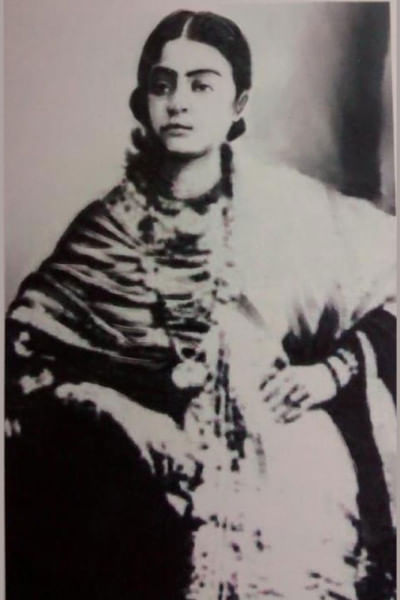
Gauhar Jaan aka Eileen Yeoward was not Armenian. Here's why.
Over the years, a great deal has been written about Gauhar Jaan the Indian singer and dancer. Introductions to her early life are usually her baptism name, her father's name and that she was of "Armenian descent". Let's take a look and see where that statement originates. A quick search in Google and the first page to appear is Wikipedia. Her name was Angelina Yeoward, born 26th June 1873 in Azamgarh, her father was William Robert Yeoward, and she was of Armenian descent. (1) I followed the citations used for this information, and these are:
· Vikram., Sampath (2010). "My name is Gauhar Jaan!" : the life and times of a musician. New Delhi: Rupa & Co. ISBN 9788129116185. OCLC 631243857.
· Savitha Gautam (13 May 2010). "The Hindu : Arts / Music : Recording Gauhar Jaan". Beta.thehindu.com. Retrieved 29 January 2012.
As far as I can see, the book by Vikram Sampath does not have a source cited, and the article by Savitha Gautam only refers back to the book.
The next result on the search http://chandrakantha.com/biodata/gauhar_jan.html states William Robert Yeoward was an Armenian Jew. Also running with the Armenian Jew theory is https://www.mustrad.org.uk/articles/gauhar.htm. https://www.last.fm/music/Gauhar+Jan/+wiki also feels William Robert Yeoward to be an Armenian Jew, but also states "…..who married a Jewish Armenian lady, Allen Victoria Hemming around 1870.(sic) Victoria was born and brought up in India….".
I do not attempt to write anything new about Gauhar Jaan and her career, there are many people who have done that already and made an excellent job of it. What I have done is taken a look at the Yeoward family name she was born with and I explore the persistent "half Armenian" claim she is so connected to.
In the book My name is Gauhar Jaan! it recalls the case of Gauhar Jaan regarding a claim about unpaid cloth in 1890 where her mother, Malka Jaan gave evidence:
"In her elaborate testimony in the Court of Banaras, Malka made the following submission:
'In this Court of the Munsif at Benares (#545 of the year 1889)—Makhan Lall Vs. Gowhar Jan. Statement of the defendant Malka, a witness for the defendant on 26 June 1890 on oath under Act X of 1873 administered by Gouri Sunker, peon. Present Babu Bipin Behari Mukherjee himself. The defendant gives her name to be Malka Jaan, class Tawaif, residence Mohalla, Lower Chitpore Road, Calcutta; age 32 years, occupation: that of her class. She is literate and states as follows:……………. ………I was a Christian at first and now I am an Armenian; and when I was a Christian my name then was Adeline Victoria Hemmings.""
This is a confusing and contradictory statement. An Armenian is a Christian, they are not two separate denominations as stated by Malka Jaan. What was she saying exactly? It would seem she didn't appear to know. By living in the area of Calcutta where other Armenians lived, doesn't make you an Armenian. On checking the Church registers for the period 1876 to 1889 for baptism conversions (for example, from another religion to Christianity), there is nothing to indicate that Malka Jaan had been baptised into the Armenian Church and therefore no evidence she could legitimately call herself Armenian.
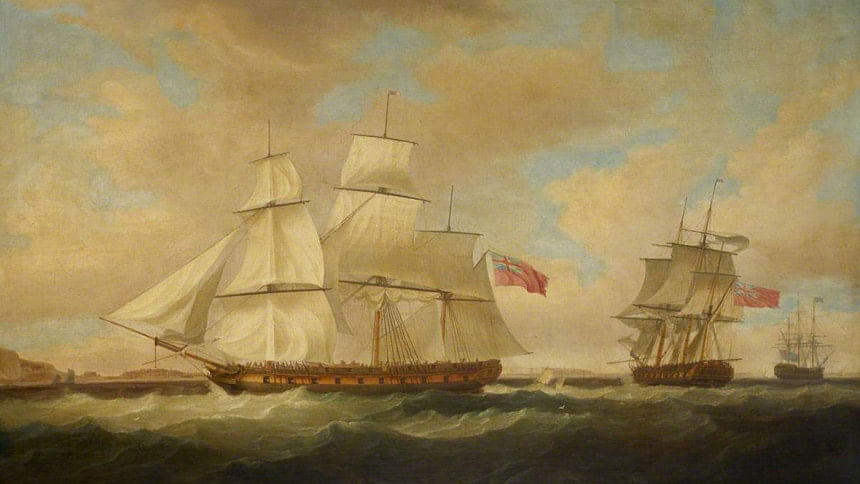
A few years later, in 1911 there was an inheritance court case where Gauhar Jaan was challenged by a supposed brother to an inheritance of her mother Malka Jaan. Gauhar Jaan's accuser, was a man called Bagaloo. He argued that Gauhar Jaan was not the legitimate child of Malka Jaan, but rather he was. He further claimed that as he was legitimate, he should be entitled to the whole of the estate left by Malka Jaan. However, he continued to argue that if it was found that Gauhar Jaan was the daughter of Malka Jaan, then he (Bagaloo) was entitled to a part of the estate. Bagaloo argued that in 1870, Malka Jaan came to Calcutta and Gauhar Jaan was born of an Armenian gentleman. As the court case progressed, no one other than Bagaloo referred to Robert Yeoward as Armenian, the Court records refer to him as European or Eurasian, but never Armenian. Why would Bagaloo say this? Perhaps because he was simply clutching at every straw he possibly could to try and win the case and get the money. Perhaps he actually believed it. Gauhar Jaan's mother Malka Jaan, probably wasn't aware of Robert's true background and identity and, of course, there is always the possibility that he positively encouraged her to think he was Armenian. Whichever scenario it was, the label Armenian has stuck over the years. Many books, articles, publications, news reports, documentaries, tall stories, short stories, most stories have all claimed Gauhar Jaan to be of Armenian heritage.
Several days of the hearing passed, the end result was the case being thrown out of court by the Judge. He felt the evidence given by the hopeful accuser was not to be believed and Gauhar Jaan won. During the hearing, much was made and discussed about her lineage and even though she had not been in touch with or seen her father during the course of her life, remarkably, she was able to find him and persuade him to attend Court to give evidence. Shaky though it was, he managed to convince the Judge of his status and respectability. In Court, he freely admitted that he had given his grandfather's name, William Henry Yeoward, on the marriage certificate with Adelina, instead of his father's name of Charles William Yeoward. This effectively confirmed his Yeoward lineage and he managed to brush away this mistake as nerves. Indeed, there was some ambiguity regarding how he remembered his own father and grandfather, and even how his own name was spelt.
Robert Yeoward, was cross-examined by Mr. A.N. Chaudhuri appearing for Bagaloo. Chaudhuri said "in connection with the statement he (Robert) made on Wednesday regarding his father's name he mixed up his grandfather's name with his father's name. Where he should have given his father's name he gave his grandfather's name. Ellen Angelina was the name of his daughter."
Chaudhuri: "Can you tell me how she calls herself Allen Angelina?
Yeoward: I cannot
Chaudhuri: How do you spell your name?
Yeoward: Zeoward
Chaudhuri: In this letter (shown) you have spelt your name Zearward
Yeoward: That is due to my hand shaking
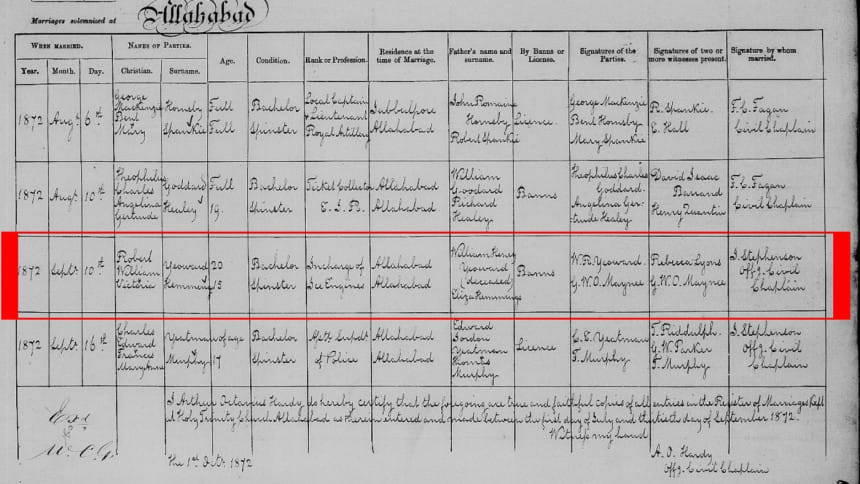
To confuse matters even further, I believe the name 'Zeoward/Zearward' to be a typesetting error with the newspaper(2) report at the time. This contributes negatively to the point being made by Counsel, and further accentuates Robert's inability to credit himself and also help defend Gauhar Jaan. In earlier reports of this case, the same newspaper used the name 'Zeard' instead of Yeoward. At times, Robert Yeoward does not appear to come over particularly confidently, this may have been interpreted as him having something to hide. Perhaps he did, but it wasn't anything to do with his legitimate daughter Gauhar Jaan.
The whole of the far-fetched side of Bagaloo's case was deemed unbelievable by Justice Stephen and his claim to being Gauhar Jaan's half sibling was dismissed as untrue (3).
For whatever reason, Yeoward did nothing to counter the Armenian claim of Bagaloo. It would seem no one actually checked that allegation during the court case, and subsequently over the years it has carried on being repeated, and the blurred lines of untruths has become definitive lines of [supposed] truth today.
As you will see, it is hardly any wonder Robert was confused about his own parentage, his near ancestors were far more liberal than perhaps people were normally back in England.
Breaking this down logically and factually, my aim was to trace the Yeoward name. Firstly, having looked extensively at the Armenian records in India, there are NO entries for the name Yeoward. This is no surprise as it is not an Armenian name. There is no Armenian equivalent and it is not anglicized (like so many Armenian names have been) to make it a Western name. In fact, the Yeoward lineage in India stems from one English migrant. That of William Yeoward.
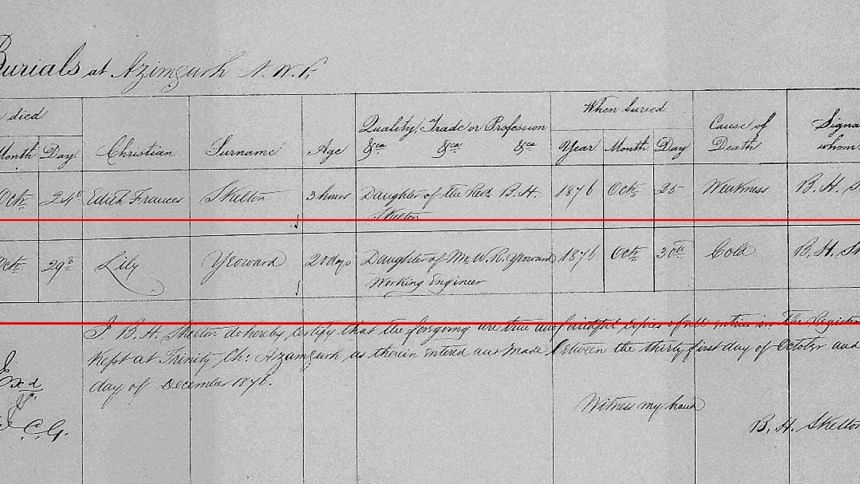
William Henry Yeoward boarded the Indiaman Warren Hastings in mid-January 1809, along with other passengers and soldiers, all with the purpose to make their way to India. In all, there were 200 people on board. It had anchored off Portland on the Dorset coast, along the south of England for 3 weeks before sailing to a rendezvous point called Motherbank. This was a stretch of water between the Isle of Wight and Portsmouth, in Hampshire. Here, it waited for the right conditions as well as other vessels in the convoy to finish preparations before it finally left the Solent on the 22nd February 1809 (4). Other ships in the convoy were Sirius, True Briton, Cumberland, Sealeby Castle, Neptune, Perseverance, Nottingham, Carnatic, Lord Duncan, Lord Melville, Lady Castlereagh and Baring. What a sight those sailing ships would have been as they glided majestically along the coast into the English Channel, onward to France and past Spain, Portugal and beyond.
On board the Warren Hastings were 194 soldiers as well as a number of civilian passengers. The mixed military and civilians had 5 months of sailing ahead of them. William Yeoward and fellow traveller James Higgins, had signed up as volunteers for the Pilot Service in India.
The ship sailed in to Diamond Harbour, Calcutta on the 18th July 1809 (5). Within three months of his arrival, William had met and married Nelly Porter (nee Nicolson). She had been widowed in 1808 when her first husband, William Porter died aged only 24. William Yeoward and Nelly married in October 1809 (6), but two years later Nelly eloped. An indignant William placed a newspaper advert in the Calcutta Morning Post:
"whereas my wife Eleanor Yeoward having eloped from her dwelling, on the 7th instant, without any just cause or provocation, this is to give notice, that I will not discharge any debt or debts which she may contract, after the date thereof. Any person or persons who may have any claim or demands on her, are requested to make their demands, within forty-eight hours, otherwise they will not be discharged. October 16, 1811. William Yeoward."
Nelly did not return to Yeoward. By 1813 Nelly had a son by a James Campbell. The child also named James Campbell, never got to see his father, he having died when he was an infant. Nelly only survived until 1817, but astutely she made a will in which she made generous provision for her young son. Thus, ensuring William Yeoward could not make a claim on his wayward wife's estate. It was very much a case of what wasn't contained in the Will, no mention or references to any Yeoward, only her Campbell son. Eleanor was buried in South Park Cemetery, Kolkata(7).
William married for the second time in 1822 (8), to Elizabeth Eastwood who was also widowed. Together they had eight children:
Charles William Yeoward – 1819
John Henry Yeoward – 1820
George Milchier Yeoward – 1822
John Richard Yeoward – 1823
Martha Matilda Yeoward – 1825
Alexander Edmond Yeoward – 1826
Emelia Yeoward – 1828
Sarah Yeoward – 1829
Their first born, Charles William Yeoward married, or had relationships with at least four women.
The first, Charlotte Curtain, he married in 1841. He had three children with Charlotte. William, born in Bareilly in October 1842 but sadly died in November of that year. Louisa born in August 1846 in Delhi. She went on to married twice, first to Thomas Marshall in 1861 in Dacca and then later to Henry Ceasar in Benares in 1868. Louisa died of consumption in Allahabad in January 1870. The third child was Robert William Yeoward born 1852, more of him presently. Charlotte died in February 1855 in Peshawar she was 28 years old.
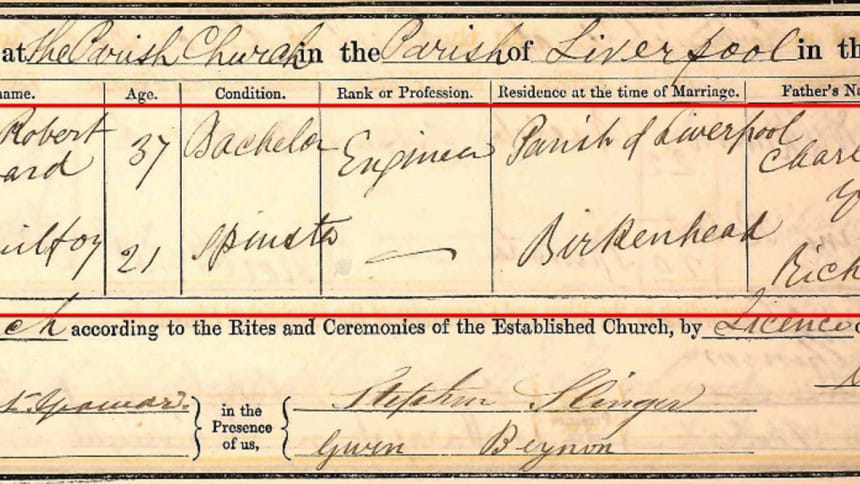
Charles quickly re-married to Catherine Domingo nee Antony in July 1855 in Peshawar. It is unknown when Catherine died, but Charles is next associated with Anna who died of fever in September 1873 in Dinapore, aged 65 years. His fourth liaison was with a woman who was born a Hindu (9), but took the name Rebecca Stevens. She was 31 years old. They married in December 1873 in Dinapore and had a daughter named Emily born in 1876. Emily went on to marry Henry Lewis in September 1892. Rebecca died in Bankipore on the 3rd February 1897 having accidentally set herself on fire, dying from the severe effects of burns.
At the time of writing this story, there was no birth record available to view for Robert William Yeoward. I believe he is likely to have been born in Peshawar, he was only three when his mother died. As can be seen, his father re-married only months after Charlotte's death. As a Drummer with the 4th Regt. Native Infantry, Charles regularly moved around India. For Robert, whose life involved 3 step-mothers, it really is no wonder he was a little vague in the Gauhar Jaan Court case.
Between 1872 and 1874 Robert Yeoward worked for Sheriff & Company. Robert married Adelina Hemmings on the 10th September 1872 in Allahabad (10).
Adelina was the daughter of Eliza Hemmings. Using the 1911 court case as a reference point, it was claimed that Eliza set up home with an Army Officer called Hardy Hemmings with whom she had two daughters, Adelina who was also known as Bikki and a second daughter called Bella.
A British Army Officer based in India should have some sort of footprint, not least, a record or notice of how he acquired his position as officer. For instance, did he start at the bottom and work his way up the ranks? If so, promotions were regularly advertised in both Indian and English newspapers in the Military Public Notices sections. The official British publication for these notifications was always the London Gazette. Using their excellent online search tool, one is able to find any official Government notice, including thousands of military posts. On searching, there are no notifications for Hardy Hemmings as a British Officer in India. Furthermore, extensive searches through Indian newspapers, such as The Times of India, The Calcutta Gazette, The Bombay Courier, The Bombay Gazette, Colonies and India, Englishman's Overland Mail, Friend of India and Statesman, Home News for India, Madras Courier, Bangalore Spectator, British Library Newspaper collection, all of the premium Gales primary sources as well as newspapers and sources at ProQuest, have turned up nothing about Hardy Hemmings. I truly question whether he was an officer, in fact I question whether he actually existed and I suggest the possibility that Eliza was simply a young woman that a British young man took advantage of. How can it be stated, with any certainty, that a man named Hemmings was actually the father of Adelina (Bikki) and Bella when there are no records to show this as a fact? It can be seen from Eileen's marriage record to Robert Yeoward that the father's name is missing and only Eliza's name is listed. This type of recording is usually made when the bride is illegitimate. Even if the father had passed away, it is normally recorded with the name and a note he is deceased. I think the 1911 court case prosecution and defence concerning the family lineage were not fully investigated, and too much was taken at face value without independent background checks being made. If Hardy Hemmings did actually exist, he certainly was not of Armenian origins, there are no records of Hemmings in the Armenian records in India.
Adelina gave birth to Eileen (Gauhar Jaan) in June 1873(11) whilst Robert was away in Dacca. In 1873, he left Sheriff's and went to work for Shark and Sons in Dacca, but that business failed, and he went back to Calcutta where he got a position with the Perseverance Ice Company. In 1876 his wife Adelina wrote to him from Allahabad advising him that a local pleader in Azamgarh, Tafasnl Hossain, wanted to finance an ice factory there. He immediately gave his job up in Calcutta and returned to Allahabad to collect his heavily pregnant wife and child. Together they went to Azamgarh. He secured a position with the factory and lived onsite, his family were about 5 miles away in the main town (12). In October 1876 (13) Robert and Adelina had another daughter in Azamgarh, whom they named Lily; a sister to Eileen. Tragically, Lily lived for only 20 days. She died of a cold (14).
The court case heard that Robert and Adelina separated and divorced around 1879, although there were no records of the divorce account available for review.
By 1880 Robert became an engineer working for Gladstone, Wyllie and Co. By 1887 he worked for the Asiatic Steam Navigation Co (15). In late 1887 he travelled back to England where he met Lena Quilfoy. They married in January 1888 in Liverpool (16).
Robert and Lena had a daughter Josephine Theodora in 1890, a half sister to Eileen (Gauhar Jaan). In June 1912 Josephine married Edward Ladbrook Hurley, a Marine Officer, at St. Thomas's Church Calcutta (17). Josephine and Edward had three children:
Alma Dorothea born in 1914, Rangoon
Edward Herbert born in 1915, Rangoon
Esther Marian born 1916 Calcutta and lived only 1 month 13 days dying, 31st October 1916
Josephine remarried in 1918 to Albert Saldana at the Registrars Office, Calcutta. (18) Josephine died in July 1927 of pneumonia and was buried in the Lower Circular Road cemetery. (19)
Robert Yeoward died in Dacca on 3rd May 1932, at 43 Grand Square, Dinapore Cantonment, two years after his daughter Gauhar Jaan. Administration of his estate was granted to Alma Dorothea Hurley, his grand-daughter and next of kin. Alma went on to marry Alwyn Francis Mcguire, and she eventually settled in Canada where she died in July 1982 in New Westminster, British Columbia.
The Yeoward family name is English and the family can trace their lineage back to the north of England.
Robert Yeoward had no Armenian in his blood line.
Eileen Yeoward aka Gauhar Jaan had no Armenian in her blood line.
Adeline Victoria Hemmings aka Malka Jaan had no Armenian in her blood line.
This is a case of if you say it often enough, repeated it often enough, quote it often enough, eventually the internet thinks it is true.
Gauhar Jaan, was talented, smart, adventurous, and most importantly ground-breaking in her art and culture, but, I'm sorry to say, she wasn't Armenian.
Liz Chater is an Armenian family history researcher and Armenian Heritage Project coordinator for the Armenian Church Dhaka.
Sources:
- 1. https://en.wikipedia.org/wiki/Gauhar_Jaan
- 2. The Englishman 20th July 1911
- 3. Times of India, 3rd August 1911, the judgment of the case
- 4. Star, London 23rd February 1809
- 5. The Calcutta Monthly Journal Vo. 15. No. 177-180, July-October 1809
- 6. BL: n1-8-203 marriage record
- 7. Index of burials recorded in BACSA`s Cemetery Record Books relating to India and Burma, P.79
- 8. BL: n1-12-178 marriage record
- 9. BL: n1-146-87 marriage record
- 10. BL: n1-141-66 marriage record
- 11. The Englishman 6 July 1911
- 12. The Englishman 13th July 1911
- 13. BL: n1-158-6 baptism record
- 14. BL: n1-158-217 burial record
- 15. The Englishman 13 July 1911
- 16. Liverpool Record Office; Liverpool, England; Reference Number: 283-PET-3-102
- 17. BL: n1-381-111 marriage record
- 18. BL: n1-431-125 marriage record
- 19. BL: n1-503-178 burial record

 For all latest news, follow The Daily Star's Google News channel.
For all latest news, follow The Daily Star's Google News channel. 


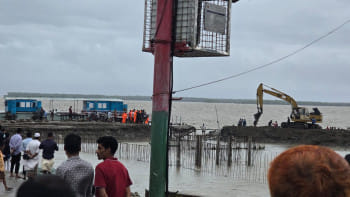
Comments